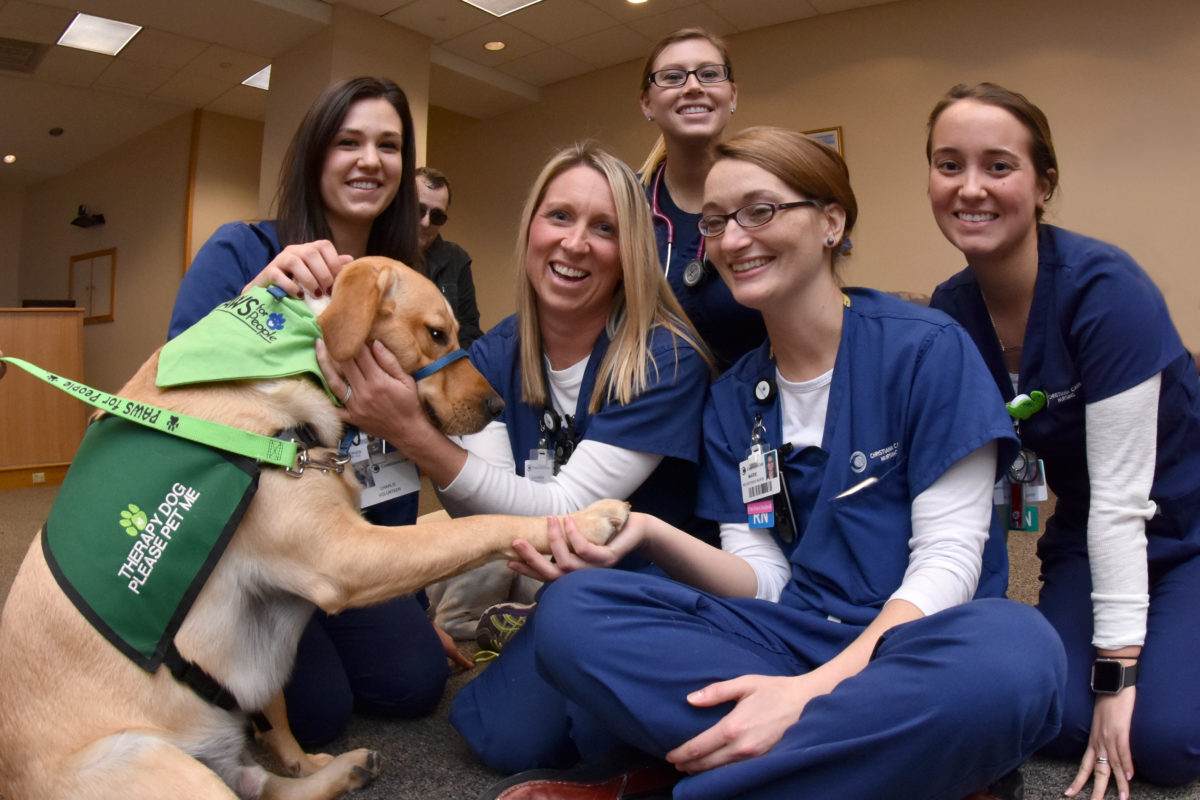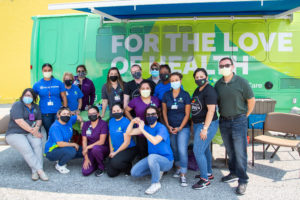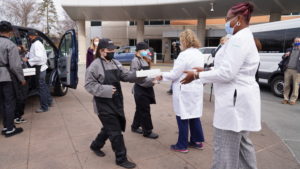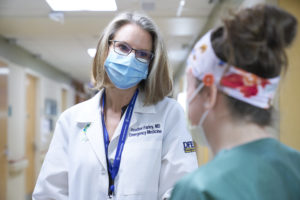As a doctor in the Emergency Department at Christiana Care Health System for 16 years, Heather Farley, M.D., FACEP, saw patients every day who were sick and suffering, victims of illness and violence. After a particularly difficult case, she began to experience feelings of distress, anxiety and guilt. She started to replay the events in her mind and even to question her decision to become a doctor.
Dr. Farley was experiencing “secondary trauma” — emotional distress that can strike health care providers following adverse outcomes or particularly difficult and traumatic cases. This experience inspired her to develop the Center for Provider Wellbeing at Christiana Care.

In health care, a profession dedicated to helping others, providers have been hesitant to seek emotional support for these reactions. Until recently, little has been understood about the consequences of secondary trauma or the emotional roller coaster providers face after an adverse patient event, like a death or unexpected complication. In an increasing body of research on provider well-being, the Agency for Healthcare Research and Quality reports that as many as half of all doctors will experience a serious adverse patient event at least once during their career.
“We go into the health care profession to care, to cure, to heal,” said Dr. Farley, who directs the Center for Provider Wellbeing. “To serve our patients with excellence and with love, we need to meet our own needs so that we can be fully engaged for them, and for one another.”
With support from Christiana Care leadership, Dr. Farley developed the Care for the Caregiver peer support program in 2015. A specially trained team of peer supporters is available around the clock to help caregivers handle stress and cope with adverse patient events. Since the program began, Care for the Caregiver has helped more than 450 health care professionals at Christiana Care.
One of them was nurse practitioner Judith G. White, who received Care for the Caregiver peer support while working in the Emergency Department.
“The support was priceless,” said White. “The continued check-ins that the program provided were also beneficial. They remained available, but at the same time they were non-intrusive and respected my privacy. I think this program has so many benefits and can help employees with a variety of needs.”
In a 2015 study published in Mayo Clinic Proceedings, more than half of all surveyed doctors reported feeling professional burnout and nearly half expressed dissatisfaction with work-life balance, a significant increase in both markers since a 2011 study. Research also shows that burnout is nearly twice as prevalent among physicians as other U.S. workers.
A National Academy of Medicine discussion paper suggests that the rise in burnout correlates to rapid changes in the U.S. health care system, including changes in clinical practice to meet the needs of an aging population with increasingly complex health needs, new payment and care models, the movement to an electronic health record and publicly reported quality metrics. The paper concludes that emotional distress and burnout among health care providers can negatively affect quality, safety and health care system performance.
“Achieving professional fulfillment isn’t just about the absence of burnout,” said Vanessa Downing, Ph.D., director of content and development training for the Center for Provider Wellbeing. “It requires being very honest about what works and what doesn’t work in our system, and accepting that individual change is not enough. What’s needed is systemwide change.”

With the leadership of Dr. Farley and her team, Christiana Care has expanded its focus beyond individual support to interventions to increase the resilience and well-being of teams, as well as programming that reaches across departments and service lines to identify the most effective ways to infuse joy and meaning into caregivers’ work. Toward this goal, the health system established the Center for Provider Wellbeing in 2016. The center is a member of the National Academy of Medicine Action Collaborative on Clinician Well-Being and Resilience, and the Physician Wellness Academic Consortium.
“The health and well-being of our own extraordinary people are essential to delivering on our mission,” said Christiana Care President and CEO Janice E. Nevin, M.D., MPH. She emphasizes that provider well-being is key to Christiana Care’s commitment to be exceptional today and even better tomorrow in providing high-quality, safe care in ways that our neighbors value.
The mission of the Center for Provider Wellbeing builds on the Triple Aim, a guiding principle to improve health, provide a better patient experience and reduce costs. The mission expands to the Quadruple Aim, which includes a vital fourth element – a positive clinician experience.
“When we focus on people, when we focus on that fourth aim of improving the experience of providing care, when we appreciate the power of cultivating joy and meaning and we tap into that innate desire within each of us to really make a difference, the results are transformational,” said Dr. Farley.
The Center for Provider Wellbeing partners with Christiana Care health care providers to learn more about their needs and goals. Currently, the center offers resources and programs including:
- Care for the Caregiver: This peer support program helps health care team members recover from adverse patient events. Care for the Caregiver is open to any Christiana Care employee or Medical-Dental staff member working at any Christiana Care health care facilities or practices. For urgent assistance following an adverse event, care team members may use Vocera web page “Care for the Caregiver” (page ID #1239).
- COMPASS: The Clinician-Organized Meetings to Promote and Sustain Satisfaction initiative encourages physician collegiality, shared experience, mutual support and meaning in work to decrease burnout and promote well-being.
- Oasis Project: The Opportunity to Achieve Staff Inspiration and Strength Project is a multifaceted approach that builds resilience within care teams by bringing “bite-sized” well-being interventions and education to caregivers while they’re working. Staff trained as well-being champions deliver evidence-based interventions meant to inoculate them against the stress of their work, and help teams build camaraderie and stronger support networks among team members. The OASIS Project culminates on each unit with dedicated space for staff to pause, de-stress, and recover.
- Ice Cream Rounds: This quarterly meeting during protected time gives residents an opportunity to dive deeply into their residency experience and explore their stressors and concerns openly and confidentially. In a relaxed atmosphere over ice cream, they learn coping skills and develop more supportive relationships with each other.
- PAWS to De-stress: These quarterly events offer opportunities for staff to connect with stress-reducing therapy dogs through the PAWS for People program.
From burnout to joy in practice
“In order to care for patients the way we would like to, we need to bring our best selves as providers,” said Patricia M. Moore, M.D., director of provider development and experience for perioperative services at the Center for Provider Wellbeing.
Even in the midst of the pace and pressure that can create increasing stress for health care professionals, it’s possible to nourish the joy and sense of purpose that led so many providers to the field.
Research shows that individual clinicians in partnership with health care teams and senior hospital leadership can alleviate workplace stress, said Stephen Swensen, M.D., MMM, FACR, medical director for Professionalism and Peer Support at Intermountain Healthcare, and senior fellow of the Institute for Healthcare Improvement, where he co-leads the Joy in Work Initiative. “We need to move more of us away from looking at our work as just a job and toward looking at it as a calling full of rewarding purpose. With time and attention, we can change the course of provider burnout.”
Dr. Swensen was keynote speaker at “Esprit de Corps: From Burnout to Joy in Practice,” the spring symposium of the Center for Provider Wellbeing, April 2 and 3 at the John H. Ammon Medical Education Center. Panel discussions on ways to support esprit de corps featured Christiana Care clinicians from inpatient and outpatient settings.
Fortunately, there are methods for establishing a satisfying work environment that fosters the ability to deliver high-quality care to patients, said Dr. Swensen. Among them is establishing a positive environment with a focus on compassion for both patients and the health professionals who care for them.
The most joyful and engaged staff feel both physically and psychologically safe, appreciate the meaning and purpose of their work, have some choice and control over their time, experience camaraderie with others at work, take care of themselves emotionally and physically and perceive their work life to be fair and equitable, said Dr. Swensen. He emphasized that this supports both clinicians and their patients.
Christiana Care is making a significant commitment to nurturing positive work settings, including establishing the Center for Provider Wellbeing, said Dr. Farley.
“We don’t just want to minimize burnout. We want our providers to flourish,” she said. “Christiana Care is an incredible place to work already, and we are committed to making it even better, while also equipping our providers with the knowledge and skills they need to thrive.”



